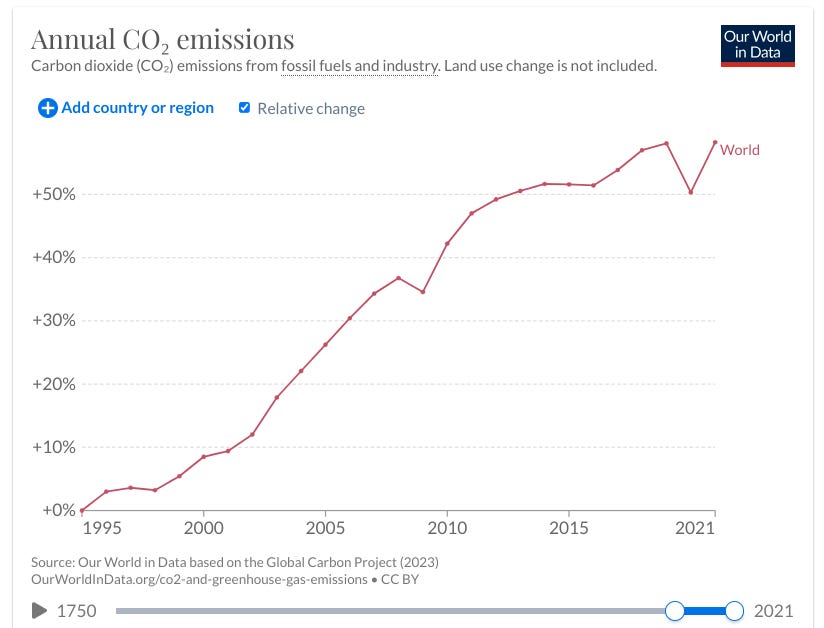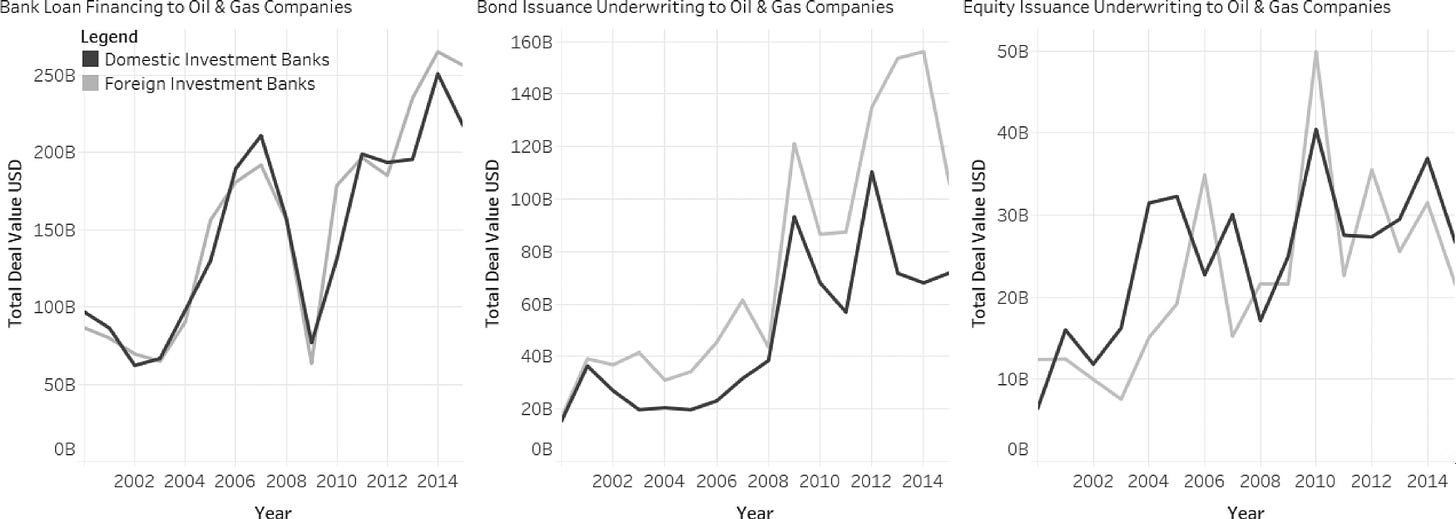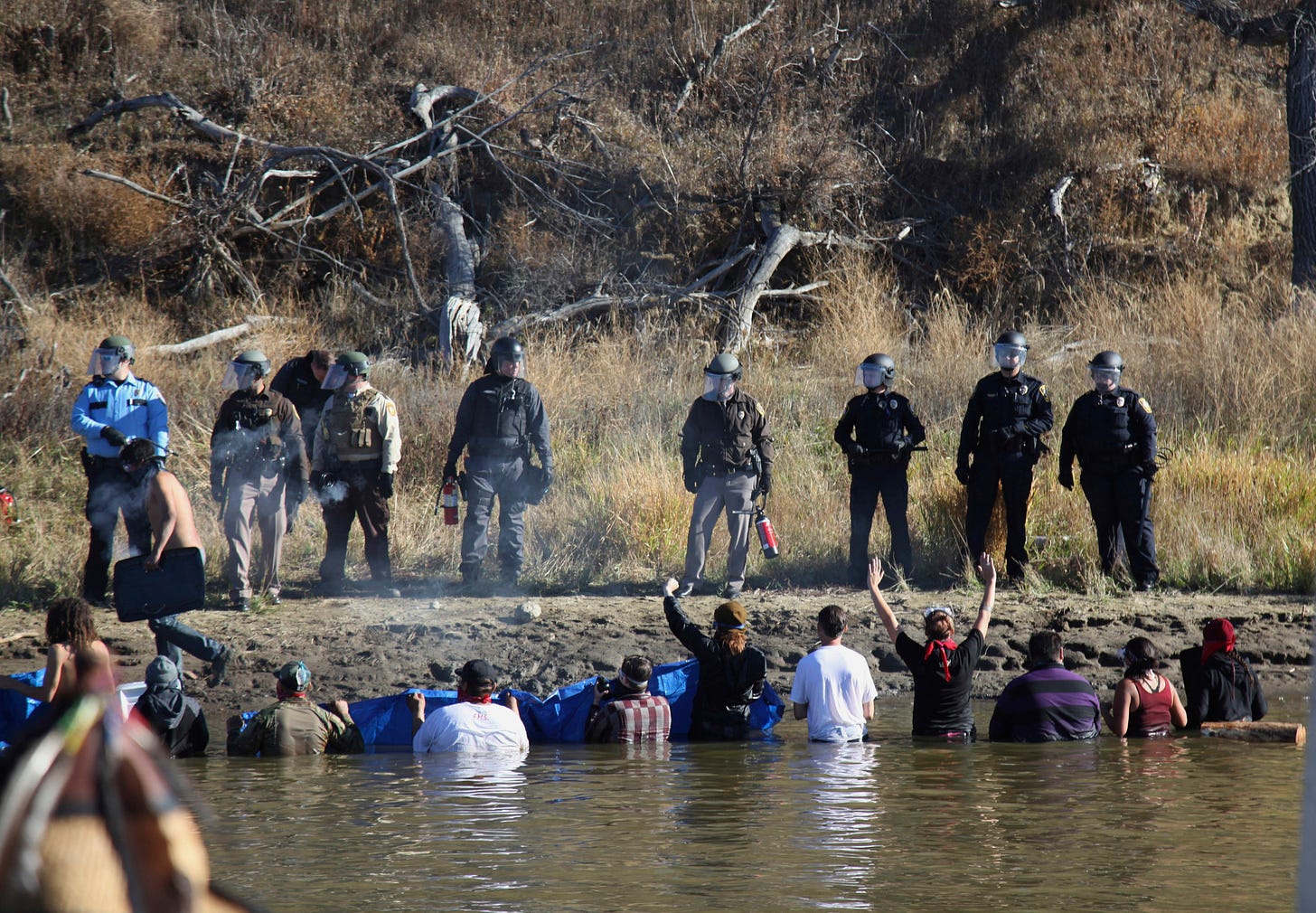
Discover more from God's Spies by Thomas Neuburger
Stranded Assets & Our Climate Future
There's always a choice. We just have to let ourselves choose it.

“If existing parties are not controlled by voters, then voters have to undertake the comparatively expensive process of running candidates of their own or lose control of the system.”
—Thomas Ferguson, “The Origins of the Investment Theory of Party Competition”“Voters have lost control of the system.”
—Yours truly
Consider the problem of “stranded assets” in the fossil fuel industry — coal, oil and gas that must be left in the ground if there is any hope at all of mitigating the global climate crisis. If we don’t mitigate the effects of global warming, what’s left is to adapt — live through the destruction caused as best we can.
The stranded assets problem has several components:
The financial loss to the fossil fuel industry of removing those assets from their balance sheets
The loss to the financial industry if the value of fossil fuel companies declines by 80% (for why 80%, see below)
The political problem of forcing those losses
Extra-political ways fo forcing those losses
Let’s take these up one at a time, but briefly. This isn’t a position paper.
Fossil Fuel Industry Losses
Consider first this, from a 2014 report, Unburnable Carbon–Are the world’s financial markets carrying a carbon bubble? (emphasis added):
Research by the Potsdam Institute calculates that to reduce the chance of exceeding 2°C warming to 20%, the global carbon budget for 2000-2050 is 886 GtCO2 . Minus emissions from the first decade of this century, this leaves a budget of 565 GtCO2 for the remaining 40 years to 2050.
The real carbon budget numbers are likely smaller than these, since every estimate of our climate future has been too conservative. But that aside, let’s accept that the world can burn no more than 565 gigatonnes (Gt) of CO2 and still keep global warming to 2°C or less.
Now consider ExxonMobil. Per their 2022 SEC filing, their declared oil-equivalent reserves stand at 17,742 million barrels of oil. The price of oil today is hovering around $75 per barrel. Without counting recovery costs, the raw value of those unexploited reserves is $1,327,500 million, or $1.3 trillion. That’s just Exxon.
In 2014, according to the Guardian, the 45 top fossil fuel companies represented $3 trillion in assets.
Yet, from the same 2014 report (emphasis added):
The total carbon potential of the Earth’s known fossil fuel reserves comes to 2795 GtCO2 . 65% of this is from coal, with oil providing 22% and gas 13%. This means that governments and global markets are currently treating as assets, reserves equivalent to nearly 5 times the carbon budget for the next 40 years. The investment consequences of using only 20% of these reserves have not yet been assessed.
If the (conservative) numbers of the 2014 report are correct, 80% of the value of fossil fuel reserves must be abandoned.
Look at this another way. Total emissions in 2021 = 37 billion tonnes = 37 Gt. If the remaining budget is 565 Gt and emissions growth continues at its current rate, we have about 15 years of emissions available to us, after which we have to stop cold or face the devil. Fifteen years from today is … pretty damn soon.
According to a 2015 letter published in Nature, “The geographical distribution of fossil fuels unused when limiting global warming to 2°C,” if the Potsdam Institute numbers quoted above are correct, these things are also true:
Globally, a third of oil reserves, half of gas reserves and over 80 per cent of current coal reserves should remain unused from 2010 to 2050.
Development of resources in the Arctic and all increase in unconventional oil production (fracking) must stop now.
Policy makers’ instincts to rapidly and completely exploit their territorial fossil fuels must stop now.
Continued expenditure on fossil fuel exploration is unnecessary and must stop now.
And, of course, the obvious, this one from me:
All fossil fuel subsidies — almost $770 billion in the G20 economies in 2021 alone — must end now.
These are tall orders. Of course, in the end, all fossil fuel companies must be put out of business, but that’s also obvious, and beside the point here.
Financial Industry Losses
According to CNBC, the “60 largest banks in the world have invested $3.8 trillion in fossil fuels since the Paris Agreement.” The order of magnitude of those investments looks like this:
This comes from a report on the effect of the fossil fuel divestment movement. Its conclusion (emphasis added):
[W]hile we find that the divestment movement has an effect on capital flows within individual countries, at an aggregate level across our 33 countries, oil and gas financing has nevertheless continued to increase at an average rate of c. [circa] 8% per year since the movement started in 2008.
So that’s the shape of the problem for financial institutions: If they stop propping the industry up financially, they clear their books of the industry’s stranded assets. If they don’t, they risk losing nearly $4 trillion in investments.
Yet so far, they’re not stepping away. They may even be doubling down.
Forcing Losses Politically
This leaves us, living people of Earth, with a problem. Can we force those losses on the non-living fossil fuel giants, on corporate financial institutions, using political means?
In other words, can we, using campaigns, elections, lobbying, and even the courts, force the institutions that control our lives to work for the benefit of flesh-and-blood entities as well?
I’m going to argue, we can’t. The reason is encased in Thomas Ferguson’s Investment Theory of Party Competition. Ferguson explains it this way (emphasis added):
At the heart of the investment approach is the acknowledgment that in most modern countries, political action is far more costly in terms of both time and money than classical democratic theories imagined. Thus the central question for analyzing political party competition becomes the extent to which ordinary citizens can bear those costs. Nothing metaphysical is implied here: to control the state citizens need to be able to share costs and pool resources easily. In practical terms, this requires functioning organizations – unions, neighborhood organizations, cooperatives, etc. – in civil society that represent them without enormous expenditures of time and money. There is one and only one guarantee of this: those organizations have to be controlled by (and, in the end, financially dependent on) their real constituents. If existing parties are not controlled by voters, then they [the voters] have to undertake the comparatively expensive process of running candidates of their own or lose control of the system. …
Where investment and organization by average citizens are weak, however, power passes by default to major investor groups, which can far more easily bear the costs of contending for control of the state. …
The result is that conflicts within the business community normally dominate contests within and between political parties – the exact opposite of what many earlier social theorists expected, who imagined “business” and “labor” confronting each other in separate parties.
Note the bolded sentence. In essence, “Conflicts within the business community dominate political contests,” not conflicts between, for example, business and labor, or business and environmentalists.
Given that only political appeals that can be financed can be brought before the public, there is thus little reason to expect that many important issues of great concern to ordinary voters are likely to find expression in the political system. In money-driven elections and policymaking, you will have candidates, elections, real competition that is not collusion, and all kinds of noise, but when the smoke clears – and there will be lots of handsomely subsidized smoke – average (“median”) voters will not determine where policy settles.
“And there will be lots of handsomely subsidized smoke” indeed.
Thus my conclusion, that campaigns, elections, the political process alone, will never suffice to force the changes we need. What politician will run on driving the value of Exxon stock to zero? What would happen to that politician if it looked like they’d win?
While I believe it’s important to apply every ounce of political pressure we can on the non-living giants that control our lives — because the enemy must be attacked from every side, and be seen to be so attacked — I do not think the victory can be won politically.
Note a secondary implication: Everyone who is doing political work to further these ends is doing good work. That work is needed for the non-political work to have maximum effect. That work is necessary and honorable. It’s just not sufficient.
Forcing Losses Extra-Politically
If we can’t force those losses through politics alone, how can we force them?
Vox asks the primary question: “Do we need a more radical climate movement?”:
Has the climate movement failed?
It’s hard to look at the world at this moment and not conclude that the answer is yes. Despite all the activism, despite all the protests, despite all the warnings, the world is still in many ways hostage to the fossil fuel industry.
A new book by Andreas Malm, a professor of human ecology at Sweden’s Lund University, asks a simple but perplexing question: Given the stakes, why hasn’t the global climate movement become far more radical than it is?
It’s a fair question. If we as a species were serious, if we really believed what we already know about climate change, we would be doing everything humanly possible to shift course. And yet we’re not. Even the most ambitious policy proposals on the table, with little chance of passing, are scarcely sufficient. This is the starting point of Malm’s book, and if you follow his logic it leads to some conclusions you may find uncomfortable.
I’ll leave the rest of the article for you to read, and encourage you to read it.
What does a “more radical climate movement” look like? I’ll also leave that to you. To help, though, ask yourself this. Working backward from the end — the end of fossil fuel use by 2050 — what has to happen? Make a list.
Then with that list, devise strategies and tactics that will force those things to occur. Remember: It’s going to take force. We’re already asked, and they’ve already said no. Eliminate violence against people, though state violence will be used in response. The rest is up to you.


Need more help? Think like a novelist. How would this work in a thriller?
Our Leaders Won’t Save Us. We Have to Save Ourselves.
As Thomas Ferguson shows, voters have already lost control of the system. Our leaders are hired by who pays them, and that’s not us.
But it’s not an impossible problem, just a difficult one. The trick is to not over-constrain the solution by adding requirements that eliminate the actual answer. “The solution must be market-driven” is such a requirement. “The solution must be political, electoral” is another.
Here’s my Easter Island Solution to Climate Change:
You're a villager on Easter Island. People are cutting down trees as fast as they can, but many are worried. What happens when all trees are gone?
At some point, worried reach critical mass, and they go to the island chief. "Look,” they say, “we have to stop cutting down trees, like now. Today."
The chief, who's CEO of a wood products company, checks his bank balance and orders the cutting continue.
Do the villagers walk away? Or kick the chief off the island?
There's always a choice.
If we don’t choose well, our legacy could look like this:









Great article, Thomas. Here is the link to a study that I think you'll be quite interested about (it would be great to hear your opinion about it): https://www.eurekalert.org/news-releases/995644
Good one, thanks.